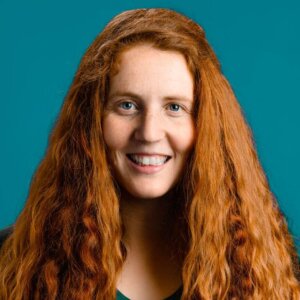How roving rabbis help the few Jews of rural Australia celebrate Rosh Hashanah
Since the 1980s, the Chabad-Lubavitch movement has sent emissaries to some of the most remote places on earth — including these places in the outback
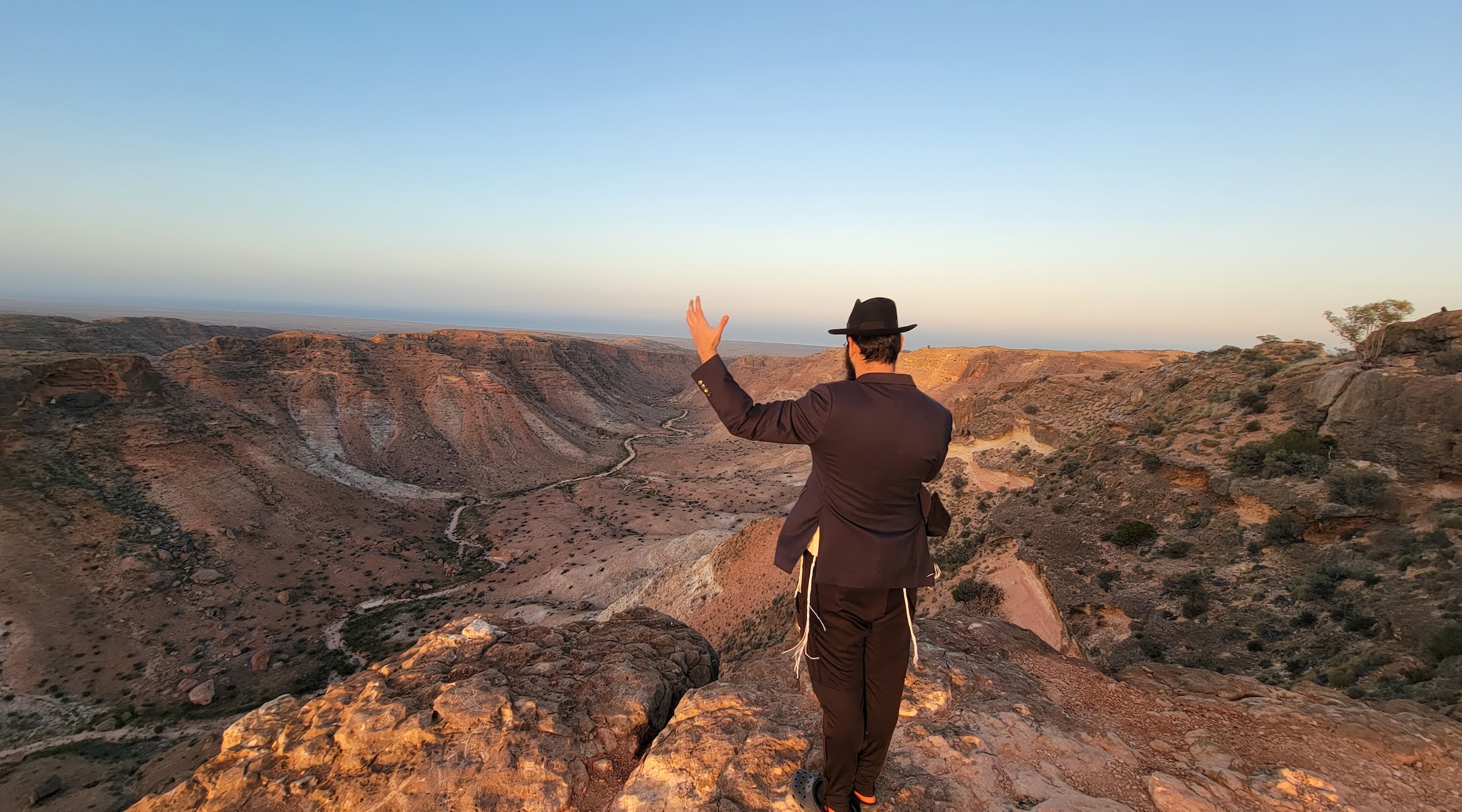
Rabbi Mendel Junik prays while overlooking the rugged outback of the Pilbara region in western Australia. (Courtesy of Rabbi Menachem Aron)
MELBOURNE (JTA) — Ruth Hannah has lived in the Australian coastal town of Mallacoota for more than 30 years. The 72-year-old daughter of Holocaust survivors knows of only one other Jewish person in her town, which has a population of 1,183 people.
Known for its beautiful beaches and wildlife, Mallacoota is located near the middle of a 650-mile coastal route from Melbourne to Sydney. Along that route, there is not a single city with more than 50,000 people within a 5-hour drive. Unsurprisingly, preparing for Jewish festivals in the region can be challenging.
“Mallacoota is one of the most remote towns in [the state of] Victoria, so we don’t have a shul,” or synagogue, said Hannah.
Since the 1980s, the Chabad-Lubavitch movement — a Hasidic sect that focuses on outreach to Jews in countries around the world — has filled the void for Hannah and thousands of other Jews scattered across the less populated areas of the outback. Most Chabad emissaries focus on Jewish life in one locale, but Rabbi Menachem Aron and his wife, Rebbetzin Shevi Aron, who are based in Melbourne, coordinate the Chabad of RARA — short for Regional and Rural Australia.
“People want connection. You see how much they need it and appreciate it. It’s really rewarding,” Rabbi Aron told the Jewish Telegraphic Agency. “You see on their faces. Living in these places is not just far away from a Jewish community, it’s also isolating. People don’t have access to the most basic things…like groceries or healthcare. You can wait eight weeks to see a [doctor]. So, it’s quite challenging for anyone.”
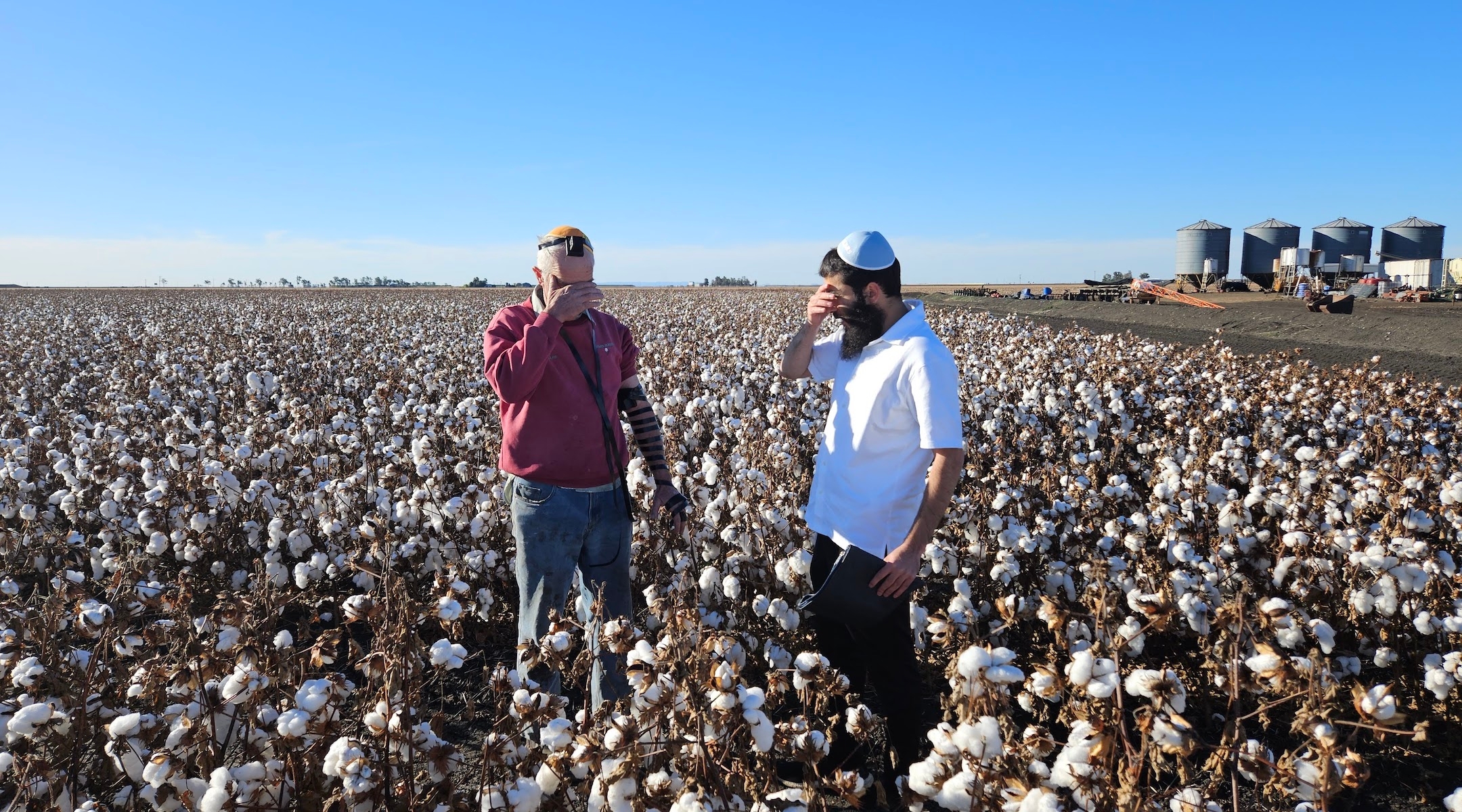
Rabbi Mendel Zarchi helps Howard Rother lay tefillin at his cotton farm in Cecil Plains, in the Australian state of Queensland. (Courtesy of Rabbi Menachem Aron)
Like other Chabad chapters around the world, the RARA branch often sends Jews care packages with food and materials to use in celebrating holidays. For Rosh Hashanah, Jews like Hannah will receive honey cookies and shofars.
But Chabad of RARA also sends out groups of roving rabbis to drive thousands of miles across Australia’s outback to visit Jews and deliver supplies in person. The Arons coordinate groups of young Chabad students from yeshivas around the world who come to Australia for the Northern Hemisphere summer, to conduct visits to Jews living across Australia in some of the least inhabited places on earth.
Young Rabbis Menachem Manssouri and Mendel Junik from Los Angeles flew to Australia in early June for a month, for example, to conduct a 2,500-mile road trip to find Jews to connect with. The trip began in Darwin — one of Australia’s most remote capital cities, which has no existing Jewish infrastructure, and according to the 2021 Australian census, a total of 91 Jews.
“We started in Darwin where we had a list [of Jewish people]. In Darwin, we probably met up with 40 Jews,” Manssouri said.
From Darwin, Manssouri and Junik flew to Broome in Western Australia and drove thousands of miles up the coast.
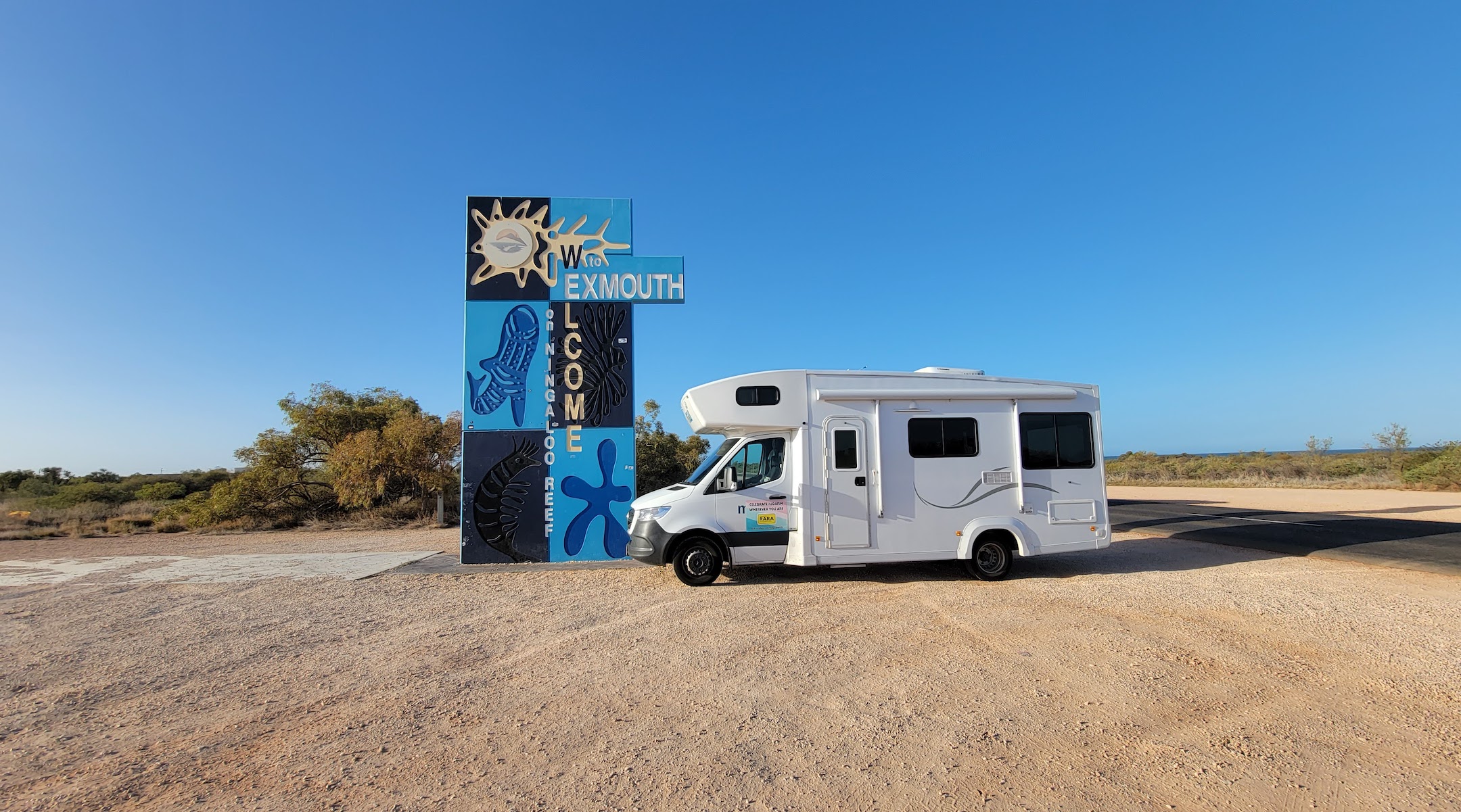
The RARA Mitzvah Mobile makes its way to Esperance, a rural town of 13,000 people in western Australia. (Courtesy of Rabbi Menachem Aron)
“We did something very unique compared to other RARA trips. We went to a lot of towns. South Hedland. Roebourne. Monkey Mia. Deham. Exmouth. No one had ever done those areas,” Manssouri said.
When asked how he located Jews in towns where there are no existing contacts, Manssouri was full of practical advice. “We go to the police station. The hospital. We walk around town to all the stores trying to get leads. We were pretty successful with that,” he said.
Manssouri is awed by the way he connected with Jews in the most unexpected places — including at one of Australia’s most remote gas stations, in Karratha, a city in the sparsely-populated Pilbara region. Manssouri talked to Jews who were waiting to fill up their RV with gas and who lived a more than 15-hour drive to the nearest synagogue.
“When you look back at it, it blows you away,” he said. “People think that they get inspired by the rabbis, but really, the rabbis get inspired by the people. It’s a two-way connection.”
Around 7 million people, or 28% of the Australian population, live in remote or rural areas, according to the country’s government. According to Aron, there are about 10,000 Jewish people living in regional and remote Australia, and he said personally keeps in contact with approximately 4,000 of them. (There are approximately 120,000 Jews in all of Australia.)
The Chabad movement is constantly extending its global footprint; in the past years emissaries have established a presence in places from Zambia to Costa Rica to the Canary Islands. Their methods of growing communities in certain countries can be contentious and cause friction with existing communities.
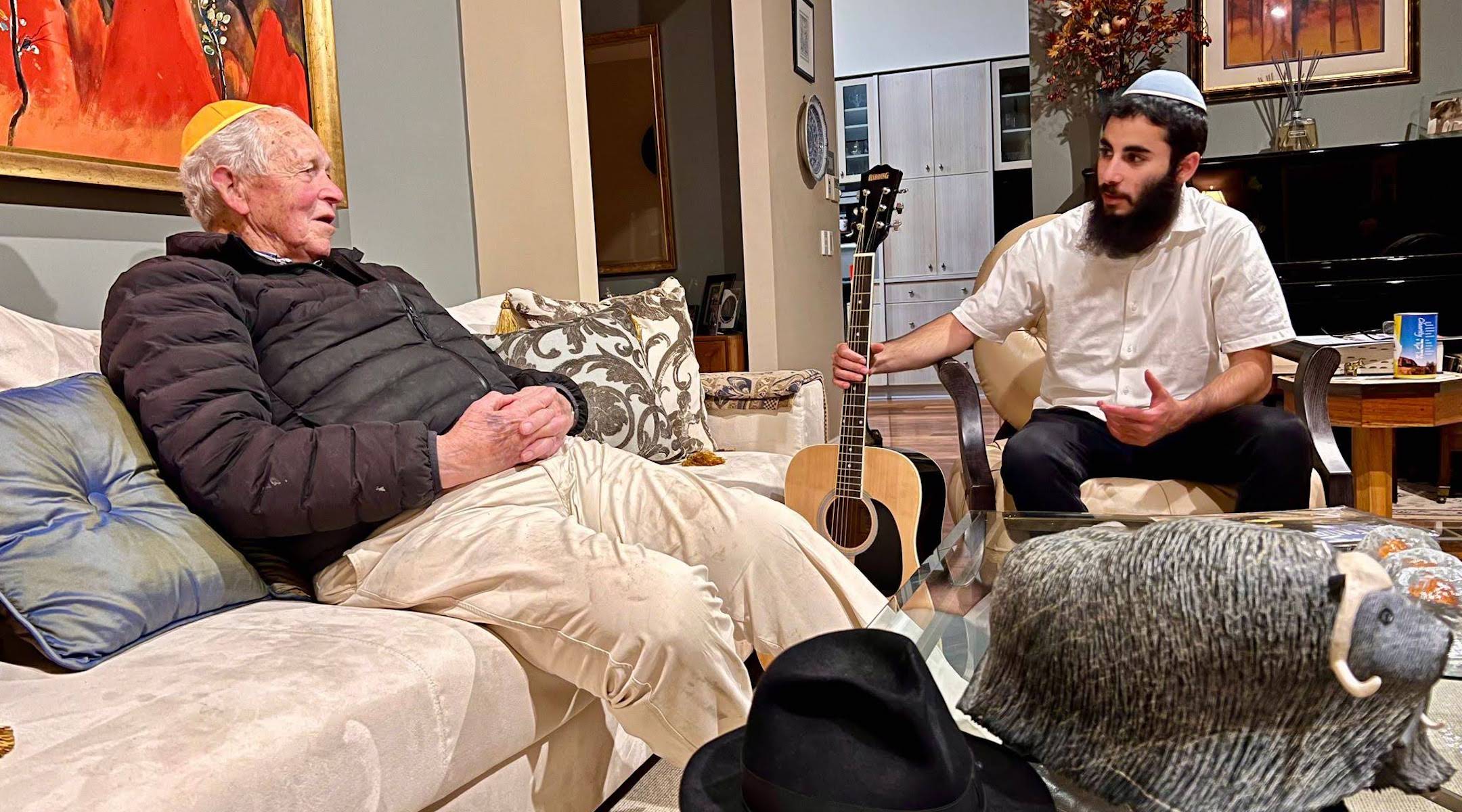
Rabbi Mendel Zarchi in conversation with Gordon Graham in Toowoomba, Queensland. (Courtesy of Rabbi Menachem Aron)
But their track record of growth is undeniable. Around 100 Jews lived in Cairns, Australia, for example — a small city in the Queensland state that’s over 1,000 miles from Brisbane, the state’s largest city — before the COVID-19 pandemic. Today, the city boasts closer to 500 Jews and what is likely the largest communal Passover seder in all of Australia, drawing over 130 people in 2021. It’s one of the Chabad centers connected to the RARA branch.
Aron nominated Groote Eylandt, an island in the Gulf of Carpentaria — which, on the northern coast of Australia is not far from Papua New Guinea — as the most exotic location he sent a shofar to in 2022. A Jewish woman working there in manganese ore mines had specifically requested one.
“Australia is four-fifths the size of the United States of America. It’s a massive country with not a lot of people in it, just 25 million,” said Aron. “There are more Jews in Boca Raton than the entire Australia. You can drive for 27 hours and still be in the same state, but we don’t let that be a barrier to connecting with others and sharing a Jewish connection.”
This article originally appeared on JTA.org.



